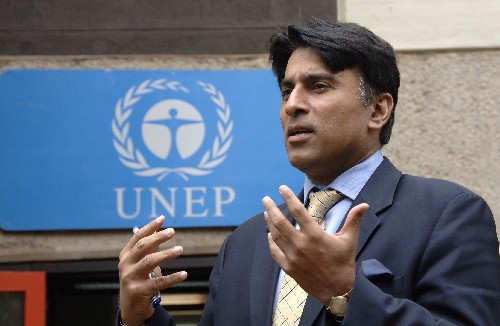 |
|
Xinhua
Satinder Bindra, Director of Division of Communications and Public Information of the UN environment agency, speaks in an interview in Nairobi, Kenya on Friday, July 25, 2008. |
China is making progress in controlling air pollution in the capital city, Beijing, where the Olympic Games will begin next month, a senior official of the United Nations Environment Program (UNEP) told Xinhua on Friday.
"If you look at last month's data, Beijing met or exceeded the National Air Standards 24 times in June of this year. There has been progress," said Satinder Bindra, Director of Division of Communications and Public Information of the UN environment agency.
This comment comes as the latest data released by the Beijing Municipal Government on Friday said major air pollutants in the city, such as carbon monoxide, carbon dioxide and particle matter emitted by vehicles, have dropped by 20 percent in the city, thanks to the vehicle restrictions for the Olympics.
Twenty-two days out of the first 25 days in July reached the standard of "blue sky" days, or days with fairly good air quality, said Li Wei, deputy secretary general of the Municipal Government.
Beijing had 145 "blue sky" days this year, 15 more than the same period last year, according to the official.
"If you look at the progress that has been made since the United Nations Environment Program started working with the Organizing Committee of the Games, there has been progress -- subway systems, solar energy, wind energy. All these things have to be taken into account," Bindra said.
"Also, one has to remember that in early Olympics too, most notably Los Angeles in 1984, there were air quality concerns. So, these issues are not specifically to Beijing. One has to consider the progress that has been made," he added.
The Chinese government says it has spent more than 16 billion U. S. dollars on environment-related projects in Beijing in the past ten years. Early this month, more measures were announced to control air pollution in the city, including taking nearly half of its 3.3 million vehicles off the roads and suspending work of more than 130 heavy-polluting factories.
Car emissions have been considered as one of the major sources of air pollution in Beijing, according to environmentalists.
Bindra said there has been "recognition everywhere, including in the international media, that measures were taken" to control air pollution in Beijing.
"Sixteen billion dollars is not a small commitment by any means. Who can say that's small?" he said.
The official described the cooperation between the UNEP and the Beijing Organizing Committee for the 2008 Olympic Games (BOCOG) as positive and productive.
"We made suggestions and they've been indeed listened to," he said.
After seven years of preparation, Beijing is confident of honoring its Green Olympic commitment with the support of Chinese people and the international community, said Liu Qi, head of the BOCOG, earlier this week, adding the city had put an emphasis on controlling air pollution and promoting landscape greening.
"I'd like to call on all parties to be supportive while people are doing or try to do something for the environment," said Bindra. "Change has to be incremental. It's not going to come suddenly."
"Large sporting events have large footprints. But more importantly, sporting events send messages to hundreds of millions of people. If you look at the audience of this Olympics, we are talking about four billion people who are going to watch. It sends a message not just to China, but also to others," he said.
"People now are really concerned (about sports)and sports has to be a very main provider as far as thinking, caring, nourishing, nurturing environmental concerns."
(Xinhua News Agency?July 26, 2008)